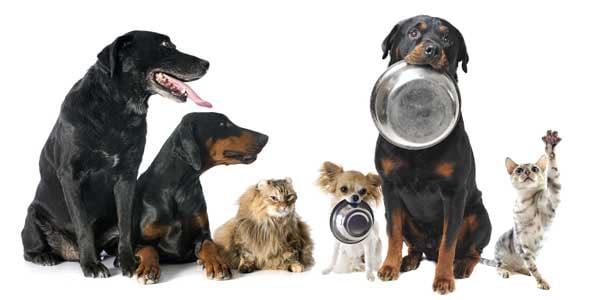
To ensure that your pets lead long, healthy lives, it's important to know their specific nutritional needs. Of course, that can seem easier said than done. With so many products on the market these days, it can be hard to tell which ones are best for your animals.
Intermountain Pet Hospital can help you determine your pet's diet. Thanks to their education and experience, our veterinarians and staff can determine which nutrients different animals need from their food.
Over the years, people have asked us many different questions about food and nutrition for their pets. We've answered some of the most common questions below:
Yes, it does. Puppies and kittens need more fat, protein, and overall calories than fully-grown dogs and cats do. Puppy/kitten food is prepared to give younger pets these extra nutrients. Also, large breed puppies have different needs than smaller puppies during their rapid growth phase.
Feeding puppies adult food can result in permanent damage. Studies have shown that large breed puppies that were fed adult food acquired a developmental bone disease. Puppies who ate puppy food, on the other hand, did not.
Yes. Your pets' dietary needs change as they age. Foods explicitly formulated for older animals have more fiber and less phosphorus, sodium, calcium, and protein. These adjustments ensure that your pet gets the nutrition he or she needs.
Unfortunately, probably not. Most OTC companies mix a variety of foods on the same production line without separating the hypoallergenic foods from the standard ones. This can cause residual ingredients to get mixed into the hypoallergenic food, making them unsafe for your pet to eat.
We recommend using food from a veterinary prescription diet company. They eliminate cross-contamination by using only one assembly line to make one type of food. This extra precaution can make the food more expensive, but it ensures you know exactly what's in your pet’s food. In the long run, this means better health and comfort for your pet and fewer veterinary expenses for you.
Here again, the answer is no. Raw diets leave your pet at risk of getting E. coli and Salmonella. Not only could your pet get sick, but you and your family could also.
Also, raw diets can’t meet your pet’s nutritional needs. According to leading nutritionists, they have too little of some nutrients and too much of others. For example, raw diets are often high in protein, which can harm older pets or those with kidney issues. Although wild animals such as coyotes and wolves stay healthy on a raw diet, it’s important to remember that they don't just eat meat; their diet also includes berries, grasses, plants, mushrooms, and melons.
Unfortunately, what's good for humans may be bad for pets. Pet owners who try putting their animals on homemade diets often assume that their pets' needs match theirs. Research has shown that's not the case: Studies have found that 90% of homemade pet foods are nutritionally unbalanced. To make matters worse, homemade diets can become harmful to animals when calcium and phosphorus ratios are inverted.
In general, you shouldn't give your pets people food either. Doing so can decrease the effectiveness of their regular pet food.
If you decide to give your pets a home-cooked diet, Intermountain can hire a veterinary nutritionist to ensure they receive the proper nutrition.
Plenty of healthy treats can help your pets lose weight. For example, you can give them an apple, green beans, or a quarter cup of carrots.
We recommend changing your pet's diet gradually over the course of seven days. Start by adding a small amount of new food to your pet's current food. Add more of the new and less of the old each day. By day seven, give your pet only the new food. This process gives your pet's body time to adjust to the new food, which can help prevent digestive upset.
Sadly, not all pet foods are created with your pet's health in mind. Some pet foods don't undergo trials to ensure they're safe for your animals. Some companies will even make their labels mimic the Association of American Feed Control Officials (AFFCO) guidelines to trick people into thinking the food is healthy.
The brands that we generally recommend to clients include:
Simply put, we trust companies that spend the time and energy to make reliably nutritious pet food. Fad diets can do more harm than good.
Not at all. By-products in pet foods are not only healthy but necessary. Vitamin E, for example, serves as a natural preservative. By-products allow manufacturers to use nutrient-rich organ meats while avoiding excess minerals from bones, which tend to be used in less expensive meals.
Actually, dogs aren't carnivores--they're omnivores. They need a balanced diet of proteins, carbohydrates, and vitamins from a variety of sources besides meat. If you give dogs just meat, their kidneys will need to work harder to convert the excess protein into waste.
Far from it. Corn is easily digestible and provides quality protein for muscle and tissue growth. It's also an excellent source of many antioxidants, such as fatty acids, beta-carotene, vitamin E, and lutein. In a review of over 200 cases of food-related allergies for dogs, less than 3% were related to corn. By contrast, 70% were connected with beef, chicken, wheat, and dairy products.
If you have specific questions about nutrition, contact us, or schedule an appointment with one of our doctors.